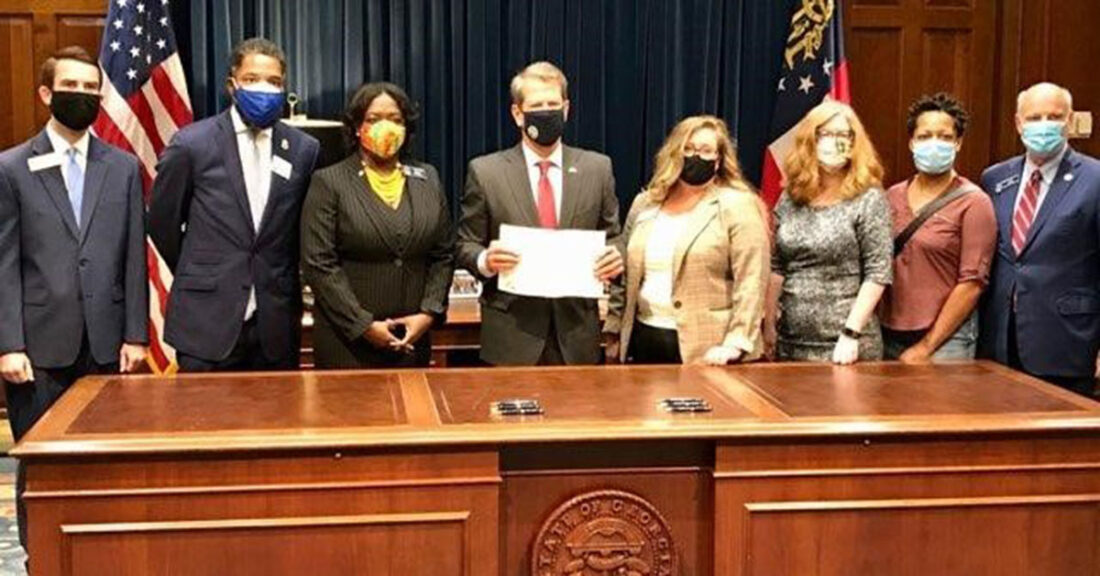Lifting Georgia’s Criminally Accused Out of Poverty

Bill signing for Georgia SB 288. From left: Rep. Houston Gaines; Fulton Co. Solicitor General Keith Gammage; Sen. Tonya Anderson; Governor Brian Kemp; Amy Lancaster-King, Metro Atlanta Chamber; Brenda Smeeton and Tamyka Sims, Georgia Justice Project; and Sen. Brandon Beach.
For its first two decades, Georgia Justice Project (GJP) provided low-income individuals in Atlanta with high-quality, free legal services, primarily in two areas: criminal defense that includes social services and resources to help formerly incarcerated people return to their communities. In 2008, the organization added a significant new capability: policy advocacy to address the destructive consequences of an arrest or conviction, including barriers to housing and employment. Today, the organization is one of the state’s most influential voices on behalf of people accused of a crime and their families, working with the state legislature to minimize the economic impact of a criminal record.
Credit for this organizational transformation, says Attorney Douglas Ammar, executive director of Georgia Justice Project, is largely attributable to his experience with the Annie E. Casey Foundation’s Children and Family Fellowship®, an intensive leadership program for outstanding social-sector executives. “The Fellowship gave me the tools and the confidence to spread our organization’s wings and expand our influence,” says Ammar.
Enhancing skills and effectiveness
Ammar began to focus more intentionally on the broader consequences of an arrest or conviction in 2003, when the Foundation’s Atlanta Civic Site approached GJP to represent 50 low-income families who were being relocated because of redevelopment, but could not get recertification of their Section 8 public housing vouchers. The reason: Someone in the family had a criminal record. Working with the Atlanta Housing Authority, Ammar and his staff helped all but two residents gain recertification. Additional GJP projects with the Casey Foundation and the housing authority prompted the latter to change its recertification process.
Impressed by his legal work and his passionate commitment to low-income clients, staff at the Atlanta Civic Site encouraged Ammar to apply for a Children and Family Fellowship. A member of the seventh class of Fellows (2007), he received leadership development that enhanced his skills and effectiveness to make an even greater difference in the lives of the criminally accused and their families. “I learned how to utilize different tools to move work forward in a more professional, goal-driven, results-oriented way,” says Ammar.
Using data to drive organizational strategy is a pillar of Results Count®, Casey’s approach to results-based leadership development — and that has played a critical role in GJP’s legislative advocacy. As an example, Ammar cites a current bill for which he is advocating related to the suspension of driver’s licenses. “One data point that has astounded legislators is that every year at least 203,000 Georgians have their driver’s licenses suspended while roughly 50,000 Georgians are arrested for driving on a suspended license,” says Ammar. “And most of those people’s licenses were suspended because they couldn’t afford to pay a traffic ticket or fell behind in their child support payments. It is an issue of poverty. And once you can’t drive, it affects your ability to get and keep a job and support your family.”
A second chance
The Fellowship support also helped Ammar collaborate effectively with partners to move bureaucratic and legislative systems. “The tools to figure out what is going on within a group, what are the drivers for folks and how to handle that, have been a huge asset,” he says. “I use those skills and think about them all the time.”
GJP’s most significant victory so far was last summer’s passage of a “second chance” bill (SB 288). Effective January 1, 2021, the law will allow many Georgia residents to restrict and seal records for certain convictions and increase their access to economic, housing and educational opportunities. Working with the Metro Atlanta Chamber, which represents businesses and nonprofits in the region, GJP demonstrated to legislators and others that the law would affect at least 1.5 million people, the vast majority of whom were convicted of misdemeanors.
“These data help to dispel some of the concerns that this bill is going to open the floodgates to folks who are going to commit more crimes,” says Ammar. “And that’s just not the case.”
GJP’s legislative agenda includes continued advocacy for “automatic expungement,” which would expand educational, housing and employment opportunities for even more Georgians. “If you were arrested and convicted five years ago for something small, and you haven’t gotten into any other trouble, you wouldn’t have to apply to a judge to seal or restrict your records,” says Ammar. “The system would automatically restrict the ability of others to see your record when you apply for a job or housing.”
Read an evaluation of the Children and Family Fellowship





